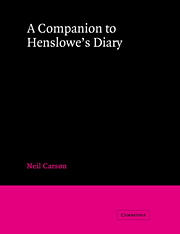Summary
WE DO NOT KNOW how Philip Henslowe, ‘citizen and dyer’, recent bridegroom and speculator in sheepskins, became attracted to the new business of the theatre. Nothing we have learned of his other interests would suggest a literary bent, nor does his enterprise or ambition in marrying his master's widow betoken a Bohemian personality. Whatever the cause, whether shrewd foresight, love of art, naked greed or a combination of all three, on 10 January 1587 Henslowe entered into partnership with one John Cholmley, grocer, to share expenses in the building of a playhouse. According to the terms of their agreement Cholmley was to have the use of a small tenement or dwelling-house on the property for storage, and the exclusive right to sell bread and drink to patrons. He was also to get one half of all the money collected from the audience attending the plays. In return he agreed to pay Henslowe an annuity of £816 in quarterly instalments of £27-10-0 over a period of eight years and three months. For his part, Henslowe promised to pay all rents and to repair the bridges and wharfs belonging to the property by the following Michaelmas (Mun. 16).
The purpose of the partnership from Henslowe's point of view was to insure himself against fluctuations in the rate of return by selling an uncertain gain for a smaller but guaranteed income.
- Type
- Chapter
- Information
- A Companion to Henslowe's Diary , pp. 14 - 30Publisher: Cambridge University PressPrint publication year: 1988

